2010 has already been a strong year for fiction lovers, with new novels by the likes of Joshua Ferris, Don DeLillo, Ian McEwan, Lionel Shriver, Jennifer Egan, and David Mitchell. Meanwhile, publishing houses offered up posthumous works by Ralph Ellison, Robert Walser, and Henry Roth, and the font of Roberto Bolaño fiction continued to flow.
The second half of 2010 will bring much anticipated work by Gary Shteyngart, Antonya Nelson, Salman Rushdie, and especially Jonathan Franzen. So that readers may set their literary calendars anew, we’ve selected a few dozen books we’re looking forward to. (The writer of each preview is noted in parenthesis.)
July (or already available)
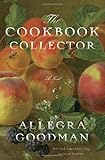 The Cookbook Collector by Allegra Goodman: I first took note of Allegra Goodman’s off-kilter prose thanks to a New Yorker short story five years ago. As it turns out, that story, gently poking fun at the exuberance of the late 1990s, but also quietly weighty, touching on pain, religion and the whole idea of being “centered,” was a piece of Goodman’s new novel, The Cookbook Collector. The book focuses on a pair of sisters at the turn of the millennium toiling on either end of the technology continuum, one the founder of a dot-com startup, the other an antiquarian book dealer. PW loves the book, calling it “Goodman’s most robust, fully realized and trenchantly meaningful work yet.” (Max)
The Cookbook Collector by Allegra Goodman: I first took note of Allegra Goodman’s off-kilter prose thanks to a New Yorker short story five years ago. As it turns out, that story, gently poking fun at the exuberance of the late 1990s, but also quietly weighty, touching on pain, religion and the whole idea of being “centered,” was a piece of Goodman’s new novel, The Cookbook Collector. The book focuses on a pair of sisters at the turn of the millennium toiling on either end of the technology continuum, one the founder of a dot-com startup, the other an antiquarian book dealer. PW loves the book, calling it “Goodman’s most robust, fully realized and trenchantly meaningful work yet.” (Max)
 The Four Fingers of Death by Rick Moody: The Four Fingers of Death is a 700 page supercollider. It brings together the various interests Rick Moody has explored in his eight previous books: metafiction, domestic drama, satire, the entertainment industry, and the Way We Live Now…er, tomorrow. The framing tale, set in the year 2025 (yes, man is still alive), concerns Montese Crandall, a self-involved writer-type who will be familiar to readers of Moody’s short stories. The longer, framed section is a Vonnegut-inspired sci-fi romp. Gradually, one imagines, the two converge. Mutual illumination ensues. (Garth)
The Four Fingers of Death by Rick Moody: The Four Fingers of Death is a 700 page supercollider. It brings together the various interests Rick Moody has explored in his eight previous books: metafiction, domestic drama, satire, the entertainment industry, and the Way We Live Now…er, tomorrow. The framing tale, set in the year 2025 (yes, man is still alive), concerns Montese Crandall, a self-involved writer-type who will be familiar to readers of Moody’s short stories. The longer, framed section is a Vonnegut-inspired sci-fi romp. Gradually, one imagines, the two converge. Mutual illumination ensues. (Garth)
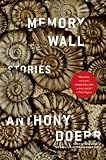 Memory Wall by Anthony Doerr: Doerr came to the attention of many readers with his debut collection of stories The Shell Collector. Now, after a novel and a travel memoir, he’s back with another collection that includes two novellas and four short stories. As with The Shell Collector, Doerr’s scope in Memory Wall is global. A recent profile with Boise Weekly — Doerr is wrapping up his tenure as Idaho’s writer in residence — places the action in China, South Africa, Germany, Korea, Lithuania, Wyoming and, of course, Idaho. (Max)
Memory Wall by Anthony Doerr: Doerr came to the attention of many readers with his debut collection of stories The Shell Collector. Now, after a novel and a travel memoir, he’s back with another collection that includes two novellas and four short stories. As with The Shell Collector, Doerr’s scope in Memory Wall is global. A recent profile with Boise Weekly — Doerr is wrapping up his tenure as Idaho’s writer in residence — places the action in China, South Africa, Germany, Korea, Lithuania, Wyoming and, of course, Idaho. (Max)
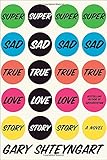 Super Sad True Love Story by Gary Shteyngart: The author of the critically acclaimed and deliriously off-kilter novels The Russian Debutante’s Handbook and Absurdistan returns with a third novel set in an apocalyptic near-future. Books are all but extinct and America is functionally illiterate, there are riots in Central Park and National Guard tanks on every Manhattan street corner, and the narrator is, as the Random House publicity department puts it, “the proud owner of what may well be the world’s last diary.” It’s difficult to resist the book’s opening lines: “Today I’ve made a major decision: I am never going to die. Others will die around me. They will be nullified. Nothing of their personality will remain. The light switch will be turned off.” (Emily M.)
Super Sad True Love Story by Gary Shteyngart: The author of the critically acclaimed and deliriously off-kilter novels The Russian Debutante’s Handbook and Absurdistan returns with a third novel set in an apocalyptic near-future. Books are all but extinct and America is functionally illiterate, there are riots in Central Park and National Guard tanks on every Manhattan street corner, and the narrator is, as the Random House publicity department puts it, “the proud owner of what may well be the world’s last diary.” It’s difficult to resist the book’s opening lines: “Today I’ve made a major decision: I am never going to die. Others will die around me. They will be nullified. Nothing of their personality will remain. The light switch will be turned off.” (Emily M.)
 Faithful Place by Tana French: Faithful Place is the #1 Indie Next Pick for the month of July. (This is a big deal—it means that independent booksellers across the United States have picked French’s new novel as their favorite out of all the books being published in the US in July 2010.) This alone should be enough to make us sit up and take notice,
Faithful Place by Tana French: Faithful Place is the #1 Indie Next Pick for the month of July. (This is a big deal—it means that independent booksellers across the United States have picked French’s new novel as their favorite out of all the books being published in the US in July 2010.) This alone should be enough to make us sit up and take notice,
but the plotline is particularly beguiling: when Frank Mackey was nineteen, he made plans with his girlfriend Rosie to leave the poverty and dysfunction of their lives in Dublin’s inner city and flee to London. But Rosie never appeared on the night they were supposed to meet, and Frank, assuming that she’d changed her mind, went on to England without her. Twenty-two years later, a suitcase is found behind a fireplace in a run-down building on the street where Frank grew up; when it becomes clear that the suitcase belonged to Rosie, Frank returns home to try and unravel the mystery of what happened to her. French is also the author
of two previous critically-acclaimed novels: In the Woods, which won the Edgar, Barry, Macavity, and Anthony awards, and The Likeness. (Emily M.)
The Thieves of Manhattan by Adam Langer: Adam Langer, who is the author of the well-received Crossing California and two other books, will publish The Thieves of Manhattan this month. In a starred review, Publishers Weekly called it “an über-hip caper that pays homage to and skewers the state of publishing and flash-in-the-pan authors… Part Bright Lights, Big City, part The Grifters, this delicious satire of the literary world is peppered with slang so trendy a glossary is included.” (Edan)
The Return and The Insufferable Gaucho by Roberto Bolaño: The frenzy of posthumous Bolaño publication continues. The Return (July) is a new volume of short stories. And The Insufferable Gaucho (August) — more stories, plus two essays — was apparently the last book Bolaño delivered to a publisher. And we hear there’s more “new” Bolaño to come in 2011. (Max)
August
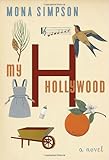 My Hollywood by Mona Simpson: Simpson, author of Anywhere but Here and Off Keck Road, among others, took ten years to write this new novel about Claire, who has recently moved to Los Angeles with her husband and young son, and Lola, their Filipina nanny. In Publishers Weekly, Simpson said, “There are thousands of women who are here working, often with their own young children left behind. That leads to a whole different vision of what it is to raise a child, what’s important.” (Edan)
My Hollywood by Mona Simpson: Simpson, author of Anywhere but Here and Off Keck Road, among others, took ten years to write this new novel about Claire, who has recently moved to Los Angeles with her husband and young son, and Lola, their Filipina nanny. In Publishers Weekly, Simpson said, “There are thousands of women who are here working, often with their own young children left behind. That leads to a whole different vision of what it is to raise a child, what’s important.” (Edan)
 Hollywood by Larry McMurtry: Although Texas epicist Larry McMurtry has written dozens of novels, he’s best known for the films that have come from them: The Last Picture Show, Terms of Endearment, Hud, and the CBS colossus “Lonesome Dove.” Over the last five decades, he’s turned others’ work into triumph (Brokeback Mountain), seen his own ground into pabulum (Texasville), and written a screenplay for The Cougar (John Mellencamp’s Falling From Grace). In short, he’s a veteran of the L.A. movie wars, and in Hollywood—his third memoir in as many years—he’ll share the stories behind them. Or, at least, he should: in a harsh review of his second memoir, 2009’s Literary Life, The New York Times wrote, “Too often… Mr. McMurtry will sidle up to an interesting anecdote and then tell the reader to wait for his third and concluding memoir, Hollywood… He’ll explain then.” (Jacob)
Hollywood by Larry McMurtry: Although Texas epicist Larry McMurtry has written dozens of novels, he’s best known for the films that have come from them: The Last Picture Show, Terms of Endearment, Hud, and the CBS colossus “Lonesome Dove.” Over the last five decades, he’s turned others’ work into triumph (Brokeback Mountain), seen his own ground into pabulum (Texasville), and written a screenplay for The Cougar (John Mellencamp’s Falling From Grace). In short, he’s a veteran of the L.A. movie wars, and in Hollywood—his third memoir in as many years—he’ll share the stories behind them. Or, at least, he should: in a harsh review of his second memoir, 2009’s Literary Life, The New York Times wrote, “Too often… Mr. McMurtry will sidle up to an interesting anecdote and then tell the reader to wait for his third and concluding memoir, Hollywood… He’ll explain then.” (Jacob)
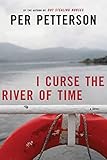 I Curse the River of Time by Per Petterson: Petterson has been on the road to international literary stardom for a few years now and that means his new novels get translated into English with relative alacrity. The book won the Norwegian Brage prize and, according to a “sample translation” on Petterson’s agent’s website, it begins: “I did not realize that my mother had left. There was too much going on in my own life. We had not spoken for a month, or even longer, which I guess was not that unusual, in 1989, when you consider the things that went on around us back then, but it felt unusual.” (Max)
I Curse the River of Time by Per Petterson: Petterson has been on the road to international literary stardom for a few years now and that means his new novels get translated into English with relative alacrity. The book won the Norwegian Brage prize and, according to a “sample translation” on Petterson’s agent’s website, it begins: “I did not realize that my mother had left. There was too much going on in my own life. We had not spoken for a month, or even longer, which I guess was not that unusual, in 1989, when you consider the things that went on around us back then, but it felt unusual.” (Max)
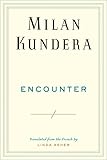 Encounter by Milan Kundera: Fans of Milan Kundera’s previous essays on the power of art (particularly that of the novel), memory, mortality, and human nature can look forward to Encounter, his newest collection, which was released in France in 2009 and will land in the English-speaking world in August. Kundera’s devotion to modernism is a particular focus here, with reflections both critical and personal on the work of established masters – Francis Bacon, Leo Janacek, Garcia Marquez, Dostoevsky, and Fellini – as well as homages to those he considers unsung, including Anatole France, Curzio, Malaparte, and Celine. (Both the Malaparte and Celine sections apparently hone in on episodes involving dogs – the dignified way in which animals face death, in contrast to human posturing and vanity – which I especially look forward to). In a review last year, Trevor Cribben Merrill described Encounter as “a self-portrait of the artist as an old man […]the most personal of Kundera’s essays.” (Sonya)
Encounter by Milan Kundera: Fans of Milan Kundera’s previous essays on the power of art (particularly that of the novel), memory, mortality, and human nature can look forward to Encounter, his newest collection, which was released in France in 2009 and will land in the English-speaking world in August. Kundera’s devotion to modernism is a particular focus here, with reflections both critical and personal on the work of established masters – Francis Bacon, Leo Janacek, Garcia Marquez, Dostoevsky, and Fellini – as well as homages to those he considers unsung, including Anatole France, Curzio, Malaparte, and Celine. (Both the Malaparte and Celine sections apparently hone in on episodes involving dogs – the dignified way in which animals face death, in contrast to human posturing and vanity – which I especially look forward to). In a review last year, Trevor Cribben Merrill described Encounter as “a self-portrait of the artist as an old man […]the most personal of Kundera’s essays.” (Sonya)
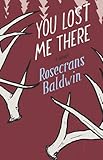 You Lost Me There by Rosecrans Baldwin: In this debut novel by the co-founder of one of The Millions’ favorite sites, The Morning News, Alzheimer’s researcher Victor Aaron discovers his late wife’s notes about the state of their marriage. Her version of their relationship differs greatly from his own, and Victor is forced to reexamine their life together. Wells Tower says the novel “is a work of lucid literary art, roisterous wit, and close, wry knowledge of the vexed circuits of the human mind and heart.” (Edan)
You Lost Me There by Rosecrans Baldwin: In this debut novel by the co-founder of one of The Millions’ favorite sites, The Morning News, Alzheimer’s researcher Victor Aaron discovers his late wife’s notes about the state of their marriage. Her version of their relationship differs greatly from his own, and Victor is forced to reexamine their life together. Wells Tower says the novel “is a work of lucid literary art, roisterous wit, and close, wry knowledge of the vexed circuits of the human mind and heart.” (Edan)
Sympathy for the Devil, edited by Tim Pratt: This anthology will collect stories from an impressive roster of writers — Neil Gaiman, Stephen King, Kelly Link, China Mieville, Michael Chabon, and others — with the devil being the common thread. This being a reprint anthology, fans of the individual authors included may find nothing new, though they may appreciate the clever theme and may encounter work by writers they don’t regularly read. (Max)
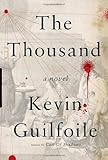 The Thousand by Kevin Guilfoile: While many readers might associate Guilfoile with McSweeney’s, where he’s a frequent contributor, or The Morning News, where with John Warner he provides essential commentary for the Tournament of Books, his fiction occupies a space that some readers might not associate with these latter-day literary tastemakers. Case in point, the titular Thousand are “a clandestine group of powerful individuals safeguarding and exploiting the secret teachings of Pythagoras.” That may sound like Dan Brown fodder, but you’ll be getting something much, much smarter. (Max)
The Thousand by Kevin Guilfoile: While many readers might associate Guilfoile with McSweeney’s, where he’s a frequent contributor, or The Morning News, where with John Warner he provides essential commentary for the Tournament of Books, his fiction occupies a space that some readers might not associate with these latter-day literary tastemakers. Case in point, the titular Thousand are “a clandestine group of powerful individuals safeguarding and exploiting the secret teachings of Pythagoras.” That may sound like Dan Brown fodder, but you’ll be getting something much, much smarter. (Max)
September
 Freedom by Jonathan Franzen: Freedom, Jonathan Franzen’s first novel in nearly a decade, is a love story – albeit one surrounded by more ideas and insights and plot-lines than many novelists manage in a career. As he anatomizes the marriage of Minnesotans Patty and Walter Berglund, Franzen also looks at environmentalism, politics, sex, gentrification, and the pains and pleasures of growing up. And though a youthful anger animates his writing on the Bush years, his patience with Patty, in particular, suggests a writer who has done some growing himself. Franzen’s longest book is also, for great swaths of pages, his best. (Garth)
Freedom by Jonathan Franzen: Freedom, Jonathan Franzen’s first novel in nearly a decade, is a love story – albeit one surrounded by more ideas and insights and plot-lines than many novelists manage in a career. As he anatomizes the marriage of Minnesotans Patty and Walter Berglund, Franzen also looks at environmentalism, politics, sex, gentrification, and the pains and pleasures of growing up. And though a youthful anger animates his writing on the Bush years, his patience with Patty, in particular, suggests a writer who has done some growing himself. Franzen’s longest book is also, for great swaths of pages, his best. (Garth)
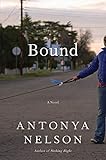 Bound by Antonya Nelson: If two women can bond by mutual disdain for a third, then reading Antonya Nelson’s fiction is like being the second woman listening as Nelson dishes tales of family, friends, and small town life with precision, venom, and humor. Typical to Nelson is a swift and biting portrait that’s as honest as it is unsentimental–consider this line from her story “Incognito” for example: “My mother the widow had revealed a boisterous yet needy personality, now that she was alone, and Eddie, least favorite sibling, oily since young, did nothing more superbly than prop her up.” Nelson’s latest novel, Bound, returns to her hometown of Wichita, Kansas, and depicts the turmoil of a couple on the rocks–the wife haunted by her past and the husband a serial adulterer–while a serial killer, the BTK (Bound Torture, and Kill), reappears after a long silence, taking vicious to a new level. (Anne)
Bound by Antonya Nelson: If two women can bond by mutual disdain for a third, then reading Antonya Nelson’s fiction is like being the second woman listening as Nelson dishes tales of family, friends, and small town life with precision, venom, and humor. Typical to Nelson is a swift and biting portrait that’s as honest as it is unsentimental–consider this line from her story “Incognito” for example: “My mother the widow had revealed a boisterous yet needy personality, now that she was alone, and Eddie, least favorite sibling, oily since young, did nothing more superbly than prop her up.” Nelson’s latest novel, Bound, returns to her hometown of Wichita, Kansas, and depicts the turmoil of a couple on the rocks–the wife haunted by her past and the husband a serial adulterer–while a serial killer, the BTK (Bound Torture, and Kill), reappears after a long silence, taking vicious to a new level. (Anne)
Zero History by William Gibson: Zero History will round out a trilogy that also includes Pattern Recognition and Spook Country. Gibson recently laid out how the three books fit into our 21st century milieu: “If Pattern Recognition was about the immediate psychic aftermath of 9-11, and Spook Country about the deep end of the Bush administration and the invasion of Iraq, I could say that Zero History is about the global financial crisis as some sort of nodal event.” (Max)
Ape House by Sara Gruen: Following her surprise hit with Water for Elephants, Gruen earned a $5 million advance for Ape House and whatever she writes next. Whether or not Gruen earns back that hefty advance, the new book sounds like madness: super smart apes — bonobos, specifically — escape a lab in an explosion and not long after, a mega-hit reality TV show appears featuring the missing apes. This reminds me of that movie Project X. (Max)
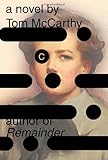 C by Tom McCarthy: One of Tom McCarthy’s many roles in addition to novelist includes acting as the General Secretary of the International Necronautical Society, who in their first manifesto declared: “our very bodies are no more than vehicles carrying us ineluctably towards death” and that “the construction of mankind’s sole chance of survival lies in its ability, as yet unsynthesised, to die in new, imaginative ways.” In keeping with these moribund tendencies, McCarthy returns with his
C by Tom McCarthy: One of Tom McCarthy’s many roles in addition to novelist includes acting as the General Secretary of the International Necronautical Society, who in their first manifesto declared: “our very bodies are no more than vehicles carrying us ineluctably towards death” and that “the construction of mankind’s sole chance of survival lies in its ability, as yet unsynthesised, to die in new, imaginative ways.” In keeping with these moribund tendencies, McCarthy returns with his second third novel, C, which in general terms deals with technology and mourning. In McCarthy’s own words, “C is about the age of the wireless: the roar of transmission, signals flung from towering masts, global reaches crackling out of earphones. And empire. And insects. And incest.” Simultaneously a bildungsroman and an anti-realist period novel, C follows the life of Serge Carrefax, the son of a man who runs a school for the blind, who grows up to become a WWI radio operator for reconnaissance planes, is imprisoned by the Germans, and escapes. The book jacket designer, Peter Mendelsund, claims that if MacCarthy’s first novel, Remainder, recalls Beckett then C reads like Joyce. McCarthy says that if Remainder is his French novel, then C is his German. If one can judge a book by its cover and anticipatory buzz, C will be one to remember. (Anne)
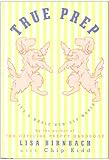 True Prep by Lisa Birnbach with Chip Kidd: The Official Preppy Handbook had that rare spark of wit that makes a good joke many things to many people. Actual preppy people were chuffed to find themselves the subject of a well-drawn lampoon (or earnestly concerned with inaccuracies), the great unwashed found an arsenal or an atlas, depending on their aspirations, and people somewhere in the middle could feel a sheepish pride in being kind of sort of related to a tribe important enough to have its own book. People with real problems, of course, didn’t care either way. Now, True Prep is upon us, and if it fulfills the 1.3 million-print run promise of its precursor, Knopf Doubleday and authors Lisa Birnbach and Chip Kidd (original collaborator Jonathan Roberts did not participate, fearing the project wasn’t true to the subversive intention of the Handbook) stand to rake it in. But the popularity of the original book, the shifting sands of American society and wealth, and the proliferation of lifestyle blogs by people with no sense of humor or irony have created a monster simulacrum of “prepdom,” one without easily defined parameters. Will the sequel be able to paint such a sharp and comic portrait as the first Handbook, or will it be yet another non-book littering the aisles of Borders? (Lydia)
True Prep by Lisa Birnbach with Chip Kidd: The Official Preppy Handbook had that rare spark of wit that makes a good joke many things to many people. Actual preppy people were chuffed to find themselves the subject of a well-drawn lampoon (or earnestly concerned with inaccuracies), the great unwashed found an arsenal or an atlas, depending on their aspirations, and people somewhere in the middle could feel a sheepish pride in being kind of sort of related to a tribe important enough to have its own book. People with real problems, of course, didn’t care either way. Now, True Prep is upon us, and if it fulfills the 1.3 million-print run promise of its precursor, Knopf Doubleday and authors Lisa Birnbach and Chip Kidd (original collaborator Jonathan Roberts did not participate, fearing the project wasn’t true to the subversive intention of the Handbook) stand to rake it in. But the popularity of the original book, the shifting sands of American society and wealth, and the proliferation of lifestyle blogs by people with no sense of humor or irony have created a monster simulacrum of “prepdom,” one without easily defined parameters. Will the sequel be able to paint such a sharp and comic portrait as the first Handbook, or will it be yet another non-book littering the aisles of Borders? (Lydia)
All is Forgotten, Nothing is Lost by Lan Samantha Chang: Chang, who is the author of one other novel, Inheritance, and a story collection, Hunger, is also the director of the Iowa Writers’ Workshop. Perhaps the Workshop inspired her new book, which is about poets at a renowned writing school. At just over 200 pages, this slim novel examines the age-old question, “What are the personal costs of a life devoted to the pursuit of art?” (Edan)
 By Nightfall by Michael Cunningham: Cunningham’s last novel Specimen Days didn’t quite replicate the critical and commercial success of The Hours. This new novel was initially called Olympia, and a long excerpt of it was published in the inaugural issue of Electric Literature. Discussing the novel, Cunningham told Entertainment Weekly, “Peter is the central character. He’s an art dealer and he finds that he is increasingly drawn to his wife’s very much younger brother, who evinces for him everything that was appealing about his wife when he first met her. He’s not gay. Well, he’s probably a little gay because we’re all a little gay, right? But it’s certainly eroticized. It’s not because he wants to f— this boy. The boy is like the young wife.” (Max)
By Nightfall by Michael Cunningham: Cunningham’s last novel Specimen Days didn’t quite replicate the critical and commercial success of The Hours. This new novel was initially called Olympia, and a long excerpt of it was published in the inaugural issue of Electric Literature. Discussing the novel, Cunningham told Entertainment Weekly, “Peter is the central character. He’s an art dealer and he finds that he is increasingly drawn to his wife’s very much younger brother, who evinces for him everything that was appealing about his wife when he first met her. He’s not gay. Well, he’s probably a little gay because we’re all a little gay, right? But it’s certainly eroticized. It’s not because he wants to f— this boy. The boy is like the young wife.” (Max)
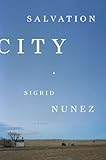 Salvation City by Sigrid Nunez: In early 2009 in these pages, Sana Krasikov considered the contention the women aren’t known for writing novels of ideas. Her rejoinder to this was Sigrid Nunez’s The Last of Her Kind, “a book that, in addition to being beautifully written, was as much about ideas as it was about characters.” This new novel exploring a dystopia — it’s set in the near future after a flu pandemic has ravaged the world and a sheltered, but cultish community has survived the carnage — seems likely to extend Krasikov’s thesis. (Max)
Salvation City by Sigrid Nunez: In early 2009 in these pages, Sana Krasikov considered the contention the women aren’t known for writing novels of ideas. Her rejoinder to this was Sigrid Nunez’s The Last of Her Kind, “a book that, in addition to being beautifully written, was as much about ideas as it was about characters.” This new novel exploring a dystopia — it’s set in the near future after a flu pandemic has ravaged the world and a sheltered, but cultish community has survived the carnage — seems likely to extend Krasikov’s thesis. (Max)
The Elephant’s Journey by Jose Saramago: From the late Nobel laureate, this novel “traces the travels of Solomon, an Indian elephant given by King John III to Archduke Maximilian II of Austria.” (Max)
October
Nemesis by Philip Roth: This latest novel from Roth should prove to be more accessible than his last, The Humbling. The book is set during a war-time polio epidemic in Newark, New Jersey in 1944. At the center of the book is a 23-year-old playground director who sees polio ravage the children he looks after. The book has been in the works since at least early 2009, when it was first described by Roth. (Max)
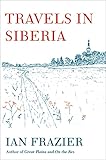 Travels in Siberia by Ian Frazier: If, like me, you were wowed when you read in The New Yorker Ian Frazier’s expansive, two-part travelogue of a trip across Siberia at the turn of the millennium, then you’ll be thrilled to find out that this massive piece was likely just a small fraction of Frazier’s forthcoming 544-page book. Frazier’s entertaining guides Sergei and Volodya (they are a pair of lovable, though sometimes frightening, curmudgeons), his insistence on traveling by car (which lent Frazier’s NYer piece many comic moments but also an unimpeachable authenticity), and the moment in history when his trip takes place (he arrives at the Pacific on September 11th, 2001), seem likely to make this book a classic. (Max)
Travels in Siberia by Ian Frazier: If, like me, you were wowed when you read in The New Yorker Ian Frazier’s expansive, two-part travelogue of a trip across Siberia at the turn of the millennium, then you’ll be thrilled to find out that this massive piece was likely just a small fraction of Frazier’s forthcoming 544-page book. Frazier’s entertaining guides Sergei and Volodya (they are a pair of lovable, though sometimes frightening, curmudgeons), his insistence on traveling by car (which lent Frazier’s NYer piece many comic moments but also an unimpeachable authenticity), and the moment in history when his trip takes place (he arrives at the Pacific on September 11th, 2001), seem likely to make this book a classic. (Max)
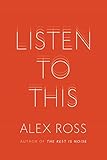 Listen to This by Alex Ross: If New Yorker music critic Alex Ross’s second book Listen to This lives up to its title essay, then we’re in for a treat. I remember being floored and invigorated by that essay in 2004; Ross’s depth of knowledge, passion, and youth – just 36 then – converted me to his cause in a blink. “I hate ‘classical music,’” he wrote, “not the thing but the name. It traps a tenaciously living art in a theme park of the past… Yes, the music can be great and serious… It can also be stupid, vulgar, and insane. Music is too personal a medium to support an absolute hierarchy of values.” In other words, no music, classical or otherwise, is categorically superior nor the moribund realm of rich ladies; all great music is by definition “something worth loving.” In Listen to This, Ross reaches beyond “classical” (his award-winning first book The Rest is Noise explored 20th century classical composers) into a more eclectic canvass — in Ross’s words, a “panoramic view” – of music worth loving, including Verdi, Brahms, Marian Anderson, Chinese classical music, Kiki and Herb, Led Zeppelin, Björk, Radiohead, Mitsuko Uchida, Esa-Pekka Salonen, and Bob Dylan. (Sonya)
Listen to This by Alex Ross: If New Yorker music critic Alex Ross’s second book Listen to This lives up to its title essay, then we’re in for a treat. I remember being floored and invigorated by that essay in 2004; Ross’s depth of knowledge, passion, and youth – just 36 then – converted me to his cause in a blink. “I hate ‘classical music,’” he wrote, “not the thing but the name. It traps a tenaciously living art in a theme park of the past… Yes, the music can be great and serious… It can also be stupid, vulgar, and insane. Music is too personal a medium to support an absolute hierarchy of values.” In other words, no music, classical or otherwise, is categorically superior nor the moribund realm of rich ladies; all great music is by definition “something worth loving.” In Listen to This, Ross reaches beyond “classical” (his award-winning first book The Rest is Noise explored 20th century classical composers) into a more eclectic canvass — in Ross’s words, a “panoramic view” – of music worth loving, including Verdi, Brahms, Marian Anderson, Chinese classical music, Kiki and Herb, Led Zeppelin, Björk, Radiohead, Mitsuko Uchida, Esa-Pekka Salonen, and Bob Dylan. (Sonya)
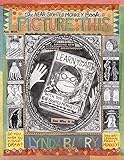 Picture This: The Near Sighted Monkey Book by Lynda Barry: For the visually patient—those who inspect collage, squint into details, and willingly sift through doodles—Lynda Barry’s work is a unique gift. The cartoonist/novelist/lecturer’s Picture This: The Near Sighted Monkey Book will continue the thread begun with 2008’s What It Is, her bust-out graphic memoir-cum-instructional. As What It Is encouraged the act of writing, Picture This will push the reader to draw and remind us of the happiness it once could bring. Remember when you filled your looseleaf margins with rough Darth Vaders and ridiculous monsters? If anyone can get us to put down our phones, pick up our pencils, and get back to that pleasure, it’s Barry—whose boundless, cramming technique is evidence of both the work and reward of creation. (Jacob)
Picture This: The Near Sighted Monkey Book by Lynda Barry: For the visually patient—those who inspect collage, squint into details, and willingly sift through doodles—Lynda Barry’s work is a unique gift. The cartoonist/novelist/lecturer’s Picture This: The Near Sighted Monkey Book will continue the thread begun with 2008’s What It Is, her bust-out graphic memoir-cum-instructional. As What It Is encouraged the act of writing, Picture This will push the reader to draw and remind us of the happiness it once could bring. Remember when you filled your looseleaf margins with rough Darth Vaders and ridiculous monsters? If anyone can get us to put down our phones, pick up our pencils, and get back to that pleasure, it’s Barry—whose boundless, cramming technique is evidence of both the work and reward of creation. (Jacob)
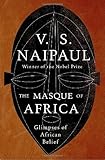 The Masque of Africa by V.S. Naipaul: V.S. Naipaul, hoping to reach “the beginning of things,” traveled to six sub-Saharan African countries and examined the belief structures found therein for The Masque of Africa, a travelogue and treatise on the role of religion in culture. Apparently Naipaul learned much from this project, which complicated his sense of an old-new dichotomy and his notion that religious practices varied greatly between nations. Naipaul’s detractors have accused him of being a colonial apologist, so it will be interesting to see how this work of non-fiction will engage with complex ideas of faith and progress, neither of which can be separated from Africa’s colonial past, nor, as Naipaul concedes, from the present-day politics of the nations he explores. (Lydia)
The Masque of Africa by V.S. Naipaul: V.S. Naipaul, hoping to reach “the beginning of things,” traveled to six sub-Saharan African countries and examined the belief structures found therein for The Masque of Africa, a travelogue and treatise on the role of religion in culture. Apparently Naipaul learned much from this project, which complicated his sense of an old-new dichotomy and his notion that religious practices varied greatly between nations. Naipaul’s detractors have accused him of being a colonial apologist, so it will be interesting to see how this work of non-fiction will engage with complex ideas of faith and progress, neither of which can be separated from Africa’s colonial past, nor, as Naipaul concedes, from the present-day politics of the nations he explores. (Lydia)
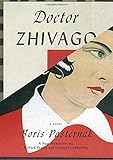 Doctor Zhivago by Boris Pasternak (translated by Richard Pevear and Larissa Volokhonsky): Pevear and Volokhonsky’s vigorous translations have turned new editions of the Russian greats into publishing events, and we’ve watched as their translations of classics like War and Peace and The Death of Ivan Ilyich and Other Stories climbed our otherwise contemporary-leaning top-ten lists. Last year, we interviewed the husband and wife team and got a sense of their unique process. In an interview around the same time with the Wall Street Journal, the couple called Zhivago the toughest of the 16 books they’ve translated: “The issue is the prose. It’s not that rich or ornate, but it’s extremely difficult to translate. His language is very studied. Even when it looks simple, it’s not. The sentences aren’t long or complex, but it’s the quality of the words. It’s never what you expect.” (Max)
Doctor Zhivago by Boris Pasternak (translated by Richard Pevear and Larissa Volokhonsky): Pevear and Volokhonsky’s vigorous translations have turned new editions of the Russian greats into publishing events, and we’ve watched as their translations of classics like War and Peace and The Death of Ivan Ilyich and Other Stories climbed our otherwise contemporary-leaning top-ten lists. Last year, we interviewed the husband and wife team and got a sense of their unique process. In an interview around the same time with the Wall Street Journal, the couple called Zhivago the toughest of the 16 books they’ve translated: “The issue is the prose. It’s not that rich or ornate, but it’s extremely difficult to translate. His language is very studied. Even when it looks simple, it’s not. The sentences aren’t long or complex, but it’s the quality of the words. It’s never what you expect.” (Max)
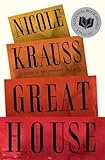 The Great House by Nicole Krauss: Bestselling author of The History of Love, Nicole Krauss returns with The Great House, a novel about a desk that, according to the publisher’s description, “contains the secrets, and becomes the obsession, of the lives it passes through… a desk of enormous dimension and many drawers that exerts a power over those who possess it or give it away.” Krauss was one of The New Yorker’s “20 under 40” writers, and “The Young Painters,” published in the magazine’s June 28, 2010 issue, is an excerpt from her forthcoming novel. You can read a Q&A with her here. (Edan)
The Great House by Nicole Krauss: Bestselling author of The History of Love, Nicole Krauss returns with The Great House, a novel about a desk that, according to the publisher’s description, “contains the secrets, and becomes the obsession, of the lives it passes through… a desk of enormous dimension and many drawers that exerts a power over those who possess it or give it away.” Krauss was one of The New Yorker’s “20 under 40” writers, and “The Young Painters,” published in the magazine’s June 28, 2010 issue, is an excerpt from her forthcoming novel. You can read a Q&A with her here. (Edan)
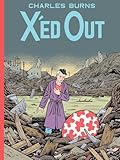 X’ed Out by Charles Burns: I once saw a comics panel discussion in which Charles Burns complained, fairly wryly, about the amount of effort he forces into his work: in one issue of Black Hole, he said, he spent hours applying his sharp black inks to an endpaper image of twigs—a picture that each reader would spend “maybe three seconds on,” then move along. Such frustration is understandable, but I don’t know that he was actually right. Each page, each panel, of Burns’ work claws you in; each line is unsettling in its perfection. He cannot be read casually. His newest, X’ed Out, will touch on typically Burnisan themes: quiet distress, eerie isolation, a heavy apocalyptic oddness. But, as always, the look of the book is the thing: we’ll be gripped by its feel as much as by its story—and, yes, take our time with its potent renderings of splintered boards, broken walls, and specimens shut in jars. (Jacob)
X’ed Out by Charles Burns: I once saw a comics panel discussion in which Charles Burns complained, fairly wryly, about the amount of effort he forces into his work: in one issue of Black Hole, he said, he spent hours applying his sharp black inks to an endpaper image of twigs—a picture that each reader would spend “maybe three seconds on,” then move along. Such frustration is understandable, but I don’t know that he was actually right. Each page, each panel, of Burns’ work claws you in; each line is unsettling in its perfection. He cannot be read casually. His newest, X’ed Out, will touch on typically Burnisan themes: quiet distress, eerie isolation, a heavy apocalyptic oddness. But, as always, the look of the book is the thing: we’ll be gripped by its feel as much as by its story—and, yes, take our time with its potent renderings of splintered boards, broken walls, and specimens shut in jars. (Jacob)
False Friends by Myla Goldberg: We included Goldberg on our own “20 under 40” list and suggested that “literary mandarins” put off by her smash-hit debut Bee Season take a look. Another opportunity to do so will arrive in October with Goldberg’s third novel. (Max)
If You’re Not Yet Like Me by Edan Lepucki: In October, Millions contributor Edan Lepucki will publish her novella If You’re Not Yet Like Me under Flatmancrooked’s New Novella imprint. The title will initially be available for limited edition presale under Flatmancrooked’s LAUNCH program, designed for emerging authors. (Max)
November:
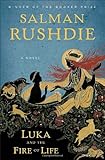 Luka and the Fire of Life by Salman Rushdie: In the wake of the fatwa and accompanying media frenzy that followed the publication of The Satanic Verses, Rushdie, apparently at the prodding of his then nine-year-old son, shifted gears to focus on something much less contentious, a children’s book called Haroun and the Sea of Stories. Now, twenty years later, Rushdie is returning with a sequel to the book he wrote for his son. Fatherhood has once again inspired Rushdie, who, according to bookseller.com, decided to write this new book for his “youngest son, Milan, who was born in 1999.” (Max)
Luka and the Fire of Life by Salman Rushdie: In the wake of the fatwa and accompanying media frenzy that followed the publication of The Satanic Verses, Rushdie, apparently at the prodding of his then nine-year-old son, shifted gears to focus on something much less contentious, a children’s book called Haroun and the Sea of Stories. Now, twenty years later, Rushdie is returning with a sequel to the book he wrote for his son. Fatherhood has once again inspired Rushdie, who, according to bookseller.com, decided to write this new book for his “youngest son, Milan, who was born in 1999.” (Max)
 Autobiography of Mark Twain: On April 21, 1910, Mark Twain died of a heart attack. His death brought to a close maybe the greatest literary life America has ever known, and it started the countdown to the publication of Twain’s autobiography, which Twain instructed was not to be released until he had been good and gone for 100 years. Well, the waiting is finally over, and from early reports it appears as though it might have taken an entire century to wrestle the mass of writing Twain left behind into publishable form. This November, the University of California Press will release the first volume in a trilogy that Twain wrote according to the rambling dictate, “talk only about the thing which interests you for the moment.” (Kevin)
Autobiography of Mark Twain: On April 21, 1910, Mark Twain died of a heart attack. His death brought to a close maybe the greatest literary life America has ever known, and it started the countdown to the publication of Twain’s autobiography, which Twain instructed was not to be released until he had been good and gone for 100 years. Well, the waiting is finally over, and from early reports it appears as though it might have taken an entire century to wrestle the mass of writing Twain left behind into publishable form. This November, the University of California Press will release the first volume in a trilogy that Twain wrote according to the rambling dictate, “talk only about the thing which interests you for the moment.” (Kevin)
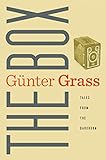 The Box: Tales from the Darkroom by Gunter Grass: The publisher’s description of this one lays out its unique premise: “In an audacious literary experiment, Günter Grass writes in the voices of his eight children as they record memories of their childhoods, of growing up, of their father, who was always at work on a new book, always at the margins of their lives.” It’s another journey into autobiography for Grass, whose Peeling the Onion set off a furor in Germany and elsewhere with its revelation that Grass had been a member of the Waffen-SS during World War II. (Max)
The Box: Tales from the Darkroom by Gunter Grass: The publisher’s description of this one lays out its unique premise: “In an audacious literary experiment, Günter Grass writes in the voices of his eight children as they record memories of their childhoods, of growing up, of their father, who was always at work on a new book, always at the margins of their lives.” It’s another journey into autobiography for Grass, whose Peeling the Onion set off a furor in Germany and elsewhere with its revelation that Grass had been a member of the Waffen-SS during World War II. (Max)
Life Times: Stories, 1952-2007 by Nadine Gordimer: FSG will collect the “best” short fiction from the South African Nobel laureate in this hefty volume. (Max)
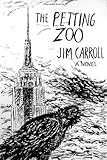 The Petting Zoo by Jim Carroll: Readers mourned the death of punk poet Jim Carroll last year. As Garth wrote in these pages, “Before he was a screenwriter, Carroll was a diarist, a frontman, an addict, and a poet, and he left behind at least a couple of very good books.” For Carroll fans, this posthumously published novel that takes the late-1980s art scene as its inspiration, will at the very least be another opportunity to experience his work and at best may be another one of those “very good books.” (Max)
The Petting Zoo by Jim Carroll: Readers mourned the death of punk poet Jim Carroll last year. As Garth wrote in these pages, “Before he was a screenwriter, Carroll was a diarist, a frontman, an addict, and a poet, and he left behind at least a couple of very good books.” For Carroll fans, this posthumously published novel that takes the late-1980s art scene as its inspiration, will at the very least be another opportunity to experience his work and at best may be another one of those “very good books.” (Max)
Selected Stories by William Trevor: This volume will collect nearly 600 pages worth of short stories from this verable master of the form. (Max)
Foreign Bodies by Cynthia Ozick: This forthcoming novel from Ozick is framed as a nifty literary trick. It’s a retelling of Henry James’ The Ambassadors, but, according to the publisher’s description, “the plot is the same, [but] the meaning is reversed.” (Max)
December:
Dead or Alive by Tom Clancy: It’s actually been seven years since the last Tom Clancy book came out, the longest gap of his career. This fact plus the usual excitement from Jack Ryan fans could make this more of a publishing event than expected. (Max)
 My Prizes by Thomas Bernhard: This collection of essays was originally published in 1980 but never in the U.S. The book will be a balm to those worked up by literary prizes and the teapot tempests they tend to foment. Bernhard’s focus here is the myriad prizes he collected and his bemused, sardonic reaction to them. The book seems likely to stand as an irreverent footnote at the intersection of 20th century literary history and 20th century publishing culture. A review of the German edition of the book suggests: “Although it’s a barrel of laughs, it’s also a serious book about what drove Bernhard to become the writer he eventually turned out to be.” (Max)
My Prizes by Thomas Bernhard: This collection of essays was originally published in 1980 but never in the U.S. The book will be a balm to those worked up by literary prizes and the teapot tempests they tend to foment. Bernhard’s focus here is the myriad prizes he collected and his bemused, sardonic reaction to them. The book seems likely to stand as an irreverent footnote at the intersection of 20th century literary history and 20th century publishing culture. A review of the German edition of the book suggests: “Although it’s a barrel of laughs, it’s also a serious book about what drove Bernhard to become the writer he eventually turned out to be.” (Max)
February 2011:
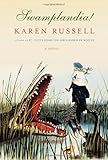 Swamplandia! by Karen Russell: Karen Russell was just 23 when she had a story in The New Yorker’s 2005 debut fiction issue. Since then, she has published an acclaimed collection of stories, St. Lucy’s Home for Girls Raised by Wolves, and been named to The New Yorker’s 20 writers under 40 list. With the accolades already piled sky high, this will be one of the more anticipated debut novels in recent years. The publishers’ description suggests we should expect big, ambitious things: “think Buddenbrooks set in the Florida Everglades.” (Max)
Swamplandia! by Karen Russell: Karen Russell was just 23 when she had a story in The New Yorker’s 2005 debut fiction issue. Since then, she has published an acclaimed collection of stories, St. Lucy’s Home for Girls Raised by Wolves, and been named to The New Yorker’s 20 writers under 40 list. With the accolades already piled sky high, this will be one of the more anticipated debut novels in recent years. The publishers’ description suggests we should expect big, ambitious things: “think Buddenbrooks set in the Florida Everglades.” (Max)
Townie: A Memoir by Andre Dubus III Dubus, already much feted for his short stories and novels, will be trying his hand at the memoir. In this case, the trajectory is from hard-bitten youth to redemption in writing. Fans can expect perhaps to gain some insights into the genesis of Dubus’ fiction. (Max)
March 2011:
You Think That’s Bad: Stories by Jim Shepard: You Think That’s Bad will be Shepard’s fourth collection of short stories, and from the Knopf catalogue description, it sounds like it won’t disappoint; there’s a story about a farm boy who “becomes the manservant of a French nobleman who’s as proud of having served with Joan of Arc as he’s aroused by slaughtering children”–need we say more? Shepard’s previous collection, Like You’d Understand, Anyway, was nominated for the National Book Award. (Edan)
The Tiger’s Wife by Tea Obreht: Obreht secured a special place in the literary pantheon not just by being on The New Yorker’s recent 20 under 40 list, but by being, at 25, the youngest one on it. With her debut novel, readers will get a larger sense of what the praise for Obreht is all about (an excerpt of the novel, in the form of a peculiar story of the same title, appeared in the magazine last year). (Max)
Unknown:
The Pale King by David Foster Wallace: When he died in September 2008, David Foster Wallace left behind more than 1,000 pages of notes and drafts of an unfinished novel that he had given the preliminary title The Pale King. The book had been in progress for more than a decade and one of the last things Wallace did before taking his own life was to tidy what he written so that it would be easier to sort after he was gone. Since then the manuscript has been in the hands of Michael Pietsch, Wallace’s longtime editor at Little, Brown, and it is expected that a version of the book running about 400 pages will be published late this year or early next. Four confirmed excerpts from The Pale King have appeared in The New Yorker and Harper’s. They suggest a story centered around IRS agents at a Midwestern processing office struggling to deal with the “intense tediousness” of their work. (Kevin)
There are many other exciting books coming out in the coming months not mentioned here – let us know what books you are most looking forward to in the comments section below.








